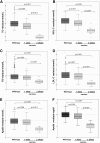Clinical characteristics and plasma lipids in subjects with familial combined hypolipidemia: a pooled analysis
- PMID: 24058201
- PMCID: PMC3826694
- DOI: 10.1194/jlr.P039875
Clinical characteristics and plasma lipids in subjects with familial combined hypolipidemia: a pooled analysis
Abstract
Angiopoietin-like 3 (ANGPTL3) regulates lipoprotein metabolism by modulating extracellular lipases. Loss-of function mutations in ANGPTL3 gene cause familial combined hypolipidemia (FHBL2). The mode of inheritance and hepatic and vascular consequences of FHBL2 have not been fully elucidated. To get further insights on these aspects, we reevaluated the clinical and the biochemical characteristics of all reported cases of FHBL2. One hundred fifteen FHBL2 individuals carrying 13 different mutations in the ANGPTL3 gene (14 homozygotes, 8 compound heterozygotes, and 93 heterozygotes) and 402 controls were considered. Carriers of two mutant alleles had undetectable plasma levels of ANGPTL3 protein, whereas heterozygotes showed a reduction ranging from 34% to 88%, according to genotype. Compared with controls, homozygotes as well as heterozygotes showed a significant reduction of all plasma lipoproteins, while no difference in lipoprotein(a) [Lp(a)] levels was detected between groups. The prevalence of fatty liver was not different in FHBL2 subjects compared with controls. Notably, diabetes mellitus and cardiovascular disease were absent among homozygotes. FHBL2 trait is inherited in a codominant manner, and the lipid-lowering effect of two ANGPTL3 mutant alleles was more than four times larger than that of one mutant allele. No changes in Lp(a) were detected in FHBL2. Furthermore, our analysis confirmed that FHBL2 is not associated with adverse clinical sequelae. The possibility that FHBL2 confers lower risk of diabetes and cardiovascular disease warrants more detailed investigation.
Keywords: ANGPTL3 mutations; angiopoietin-like 3; cardiovascular disease; diabetes mellitus; fatty liver.
Figures




Similar articles
-
Effects of angiopoietin-like protein 3 deficiency on postprandial lipid and lipoprotein metabolism.J Lipid Res. 2016 Jun;57(6):1097-107. doi: 10.1194/jlr.P066183. Epub 2016 Apr 3. J Lipid Res. 2016. PMID: 27040449 Free PMC article.
-
Clinical and biochemical characteristics of individuals with low cholesterol syndromes: A comparison between familial hypobetalipoproteinemia and familial combined hypolipidemia.J Clin Lipidol. 2017 Sep-Oct;11(5):1234-1242. doi: 10.1016/j.jacl.2017.06.013. Epub 2017 Jun 24. J Clin Lipidol. 2017. PMID: 28733173
-
Threshold Effects of Circulating Angiopoietin-Like 3 Levels on Plasma Lipoproteins.J Clin Endocrinol Metab. 2017 Sep 1;102(9):3340-3348. doi: 10.1210/jc.2016-4043. J Clin Endocrinol Metab. 2017. PMID: 28633452 Free PMC article.
-
The role of ANGPTL3 in controlling lipoprotein metabolism.Endocrine. 2016 May;52(2):187-93. doi: 10.1007/s12020-015-0838-9. Epub 2016 Jan 11. Endocrine. 2016. PMID: 26754661 Free PMC article. Review.
-
Recent developments in the genetics of LDL deficiency.Curr Opin Lipidol. 2013 Apr;24(2):111-5. doi: 10.1097/MOL.0b013e32835ca0d9. Curr Opin Lipidol. 2013. PMID: 23254474 Review.
Cited by
-
Metabolic-associated fatty liver disease and lipoprotein metabolism.Mol Metab. 2021 Aug;50:101238. doi: 10.1016/j.molmet.2021.101238. Epub 2021 Apr 20. Mol Metab. 2021. PMID: 33892169 Free PMC article. Review.
-
Silencing of ANGPTL 3 (angiopoietin-like protein 3) in human hepatocytes results in decreased expression of gluconeogenic genes and reduced triacylglycerol-rich VLDL secretion upon insulin stimulation.Biosci Rep. 2014 Dec 12;34(6):e00160. doi: 10.1042/BSR20140115. Biosci Rep. 2014. PMID: 25495645 Free PMC article.
-
Angiopoietin-like protein 3 (ANGPTL3) deficiency and familial combined hypolipidemia.J Biomed Res. 2019 Apr 22;33(2):73-81. doi: 10.7555/JBR.32.20170114. J Biomed Res. 2019. PMID: 29752428 Free PMC article.
-
The Importance of Lipoprotein Lipase Regulation in Atherosclerosis.Biomedicines. 2021 Jul 6;9(7):782. doi: 10.3390/biomedicines9070782. Biomedicines. 2021. PMID: 34356847 Free PMC article. Review.
-
Inhibition of Angiopoietin-Like Protein 3 With a Monoclonal Antibody Reduces Triglycerides in Hypertriglyceridemia.Circulation. 2019 Aug 6;140(6):470-486. doi: 10.1161/CIRCULATIONAHA.118.039107. Epub 2019 Jun 27. Circulation. 2019. PMID: 31242752 Free PMC article. Clinical Trial.
References
-
- Hooper A. J., van Bockxmeer F. M., Burnett J. R. 2005. Monogenic hypocholesterolaemic lipid disorders and apolipoprotein B metabolism. Crit. Rev. Clin. Lab. Sci. 42: 515–545 - PubMed
-
- Wu J., Kim J., Li Q., Kwok P. Y., Cole T. G., Cefalu B., Averna M., Schonfeld G. 1999. Known mutations of apoB account for only a small minority of hypobetalipoproteinemia. J. Lipid Res. 40: 955–959 - PubMed
-
- Schonfeld G., Patterson B. W., Yablonskiy D. A., Tanoli T. S., Averna M., Elias N., Yue P., Ackerman J. 2003. Fatty liver in familial hypobetalipoproteinemia: triglyceride assembly into VLDL particles is affected by the extent of hepatic steatosis. J. Lipid Res. 44: 470–478 - PubMed
-
- Cohen J., Pertsemlidis A., Kotowski I. K., Graham R., Garcia C. K., Hobbs H. H. 2005. Low LDL cholesterol in individuals of African descent resulting from frequent nonsense mutations in PCSK9. Nat. Genet. 37: 161–165 - PubMed
Publication types
MeSH terms
Substances
Supplementary concepts
Grants and funding
LinkOut - more resources
Full Text Sources
Other Literature Sources
Miscellaneous

